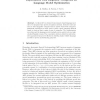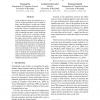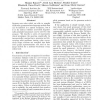11963 search results - page 37 / 2393 » A framework for linguistic modelling |
140
click to vote
CICLING
2003
Springer
15 years 7 months ago
2003
Springer
In this work1 we obtain robust category-based language models to be integrated into speech recognition systems. Deductive rules are used to select linguistic categories and to matc...
121
click to vote
ACL
2011
14 years 5 months ago
2011
Topic models have been used extensively as a tool for corpus exploration, and a cottage industry has developed to tweak topic models to better encode human intuitions or to better...
104
click to vote
COLING
2000
15 years 3 months ago
2000
Systems now exist which are able to con:pile unification gralmnars into language models that can be included in a speech recognizer, but it is so far unclear whether non-trivial l...
122
click to vote
ACL
2009
14 years 11 months ago
2009
Stochastic gradient descent (SGD) uses approximate gradients estimated from subsets of the training data and updates the parameters in an online fashion. This learning framework i...
ACL
2004
15 years 3 months ago
2004
This paper discusses the application of the Expectation-Maximization (EM) clustering algorithm to the task of Chinese verb sense discrimination. The model utilized rich linguistic...



